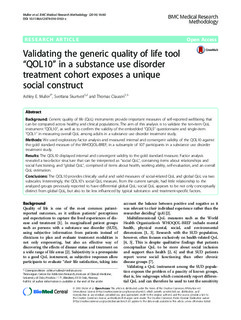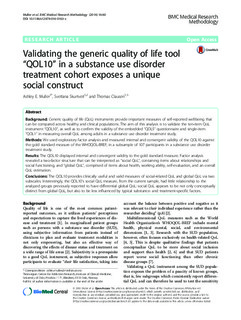| dc.contributor.author | Muller, Ashley | |
| dc.contributor.author | Skurtveit, Svetlana | |
| dc.contributor.author | Clausen, Thomas | |
| dc.date.accessioned | 2018-03-01T14:34:06Z | |
| dc.date.available | 2018-03-01T14:34:06Z | |
| dc.date.created | 2016-05-26T15:04:55Z | |
| dc.date.issued | 2016 | |
| dc.identifier.citation | BMC Medical Research Methodology. 2016, 16 . | nb_NO |
| dc.identifier.issn | 1471-2288 | |
| dc.identifier.uri | http://hdl.handle.net/11250/2488130 | |
| dc.language.iso | eng | nb_NO |
| dc.relation.uri | http://link.springer.com/article/10.1186/s12874-016-0163-x | |
| dc.title | Validating the generic quality of life tool "QOL10" in a substance use disorder treatment cohort exposes a unique social construct | nb_NO |
| dc.type | Journal article | nb_NO |
| dc.type | Peer reviewed | nb_NO |
| dc.source.pagenumber | 8 | nb_NO |
| dc.source.volume | 16 | nb_NO |
| dc.source.journal | BMC Medical Research Methodology | nb_NO |
| dc.identifier.doi | 10.1186/s12874-016-0163-x | |
| dc.identifier.cristin | 1357796 | |
| cristin.unitcode | 7502,3,12,0 | |
| cristin.unitname | Psykiske lidelser | |
| cristin.ispublished | true | |
| cristin.fulltext | postprint | |
| cristin.fulltext | original | |
| cristin.qualitycode | 1 | |

